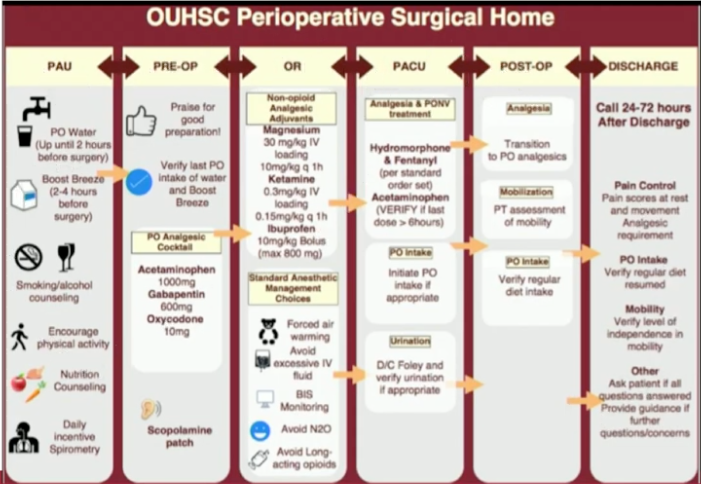Sanjay G. Patel, MD, presented “Perioperative Pathways: What We Know Works” during the 3rd Annual International Bladder Cancer Update on January 23, 2019 in Beaver Creek, Colorado.
How to cite: Patel, Sanjay G. “Perioperative Pathways: What We Know Works” January 23, 2019. Accessed Oct 2025. https://grandroundsinurology.com/perioperative-pathways-what-we-know-works/
Perioperative Pathways: What We Know Works
Sanjay G. Patel, MD, outlines the rationale behind implementing Enhanced Recovery After Surgery (ERAS) protocols in order to reduce stress, maintain postoperative physiology, and enhance mobilization for patients undergoing cystectomy. He then reviews the data evaluating different ERAS interventions in each perioperative period.
Abstract:
Clinical perioperative pathways in radical cystectomy have evolved over the last several decades. The concept of “fast-track” surgery emerged in the 1990s with the purpose of standardizing perioperative care. Since then, numerous surgical specialties have implemented Enhanced Recovery After Surgery (ERAS) pathways, a specific subset of perioperative clinical care protocols, with reported success.
This standardization of pathways reduces variability of care. It will also allow physicians to incorporate evidence based practices to improve efficiency and reduce morbidity of perioperative care. In order for this program to be successful, a team effort from multiple care providers and the patient is vital.
Given their demonstrable efficacy, this presentation will evaluate the detailed practices and data that encompass ERAS pathways as they pertain to radical cystectomy. In the preoperative period the conversation will cover the data and ERAS Society recommendations for pre-cystectomy counseling, bowel prep, fasting, carbohydrate loading, thromboembolic prophylaxis. The operative topics included will be anesthetic protocol, regional anesthesia, and individual goal-directed fluid therapy. Finally, the postoperative protocols discussed will be nasogastric tube removal, gum chewing, alvimopan administration, and early enteral feeding.
About the International Bladder Cancer Update
The International Bladder Cancer Update (IBCU) is an annual one-day CME conference focused on bladder cancer treatment updates. IBCU takes place during its sister conference, the International Prostate Cancer Update (IPCU). The conference’s faculty consists of international experts, and the event caters to urologists, urologic oncologists, and other healthcare professionals. In addition to didactic lectures, IBCU features interactive discussions, a panel roundtable, debates, and case presentations. Dr. Patel presented this lecture during the 3rd IBCU in 2019. Please visit this page in order to learn more about future IBCU meetings.
ABOUT THE AUTHOR
Sanjay G. Patel, MD, completed his undergraduate training in Biomedical Engineering at
Vanderbilt University. He proceeded to complete medical school at Vanderbilt University in
Nashville, Tennessee, and urologic surgery training at Vanderbilt University Medical Center. After
completing a Society of Urologic Oncology Fellowship at the University of Chicago, he joined the
faculty as an Assistant Professor in the Department of Urology at the University of Oklahoma in Oklahoma City.
Dr. Patel treats all urologic cancers (adrenal, kidney, ureter, bladder, urethra, and testicular
cancer) utilizing open, laparoscopic, and robotic surgery techniques. He has a particular interest
in the use of minimally invasive robotic approaches to treat urologic malignancies and has
extensive robotic surgery experience. He oversees the Bladder Instillation Clinic, where patients’ bladders
are directly treated with immunotherapy and chemotherapy to treat superficial bladder cancer. He is also developing techniques to perform intracorporeal robotic urinary diversions,
where he is using minimally invasive robotic techniques to create bladders out of the
intestinal tract.
Dr. Patel works with the Department of Engineering at the University of Oklahoma to develop novel diagnostic and therapeutic technologies to treat urologic disease. He also has an interest in genetic and molecular profiling of cancers, and how that kind of profiling can be used to guide treatment of urologic cancer.

